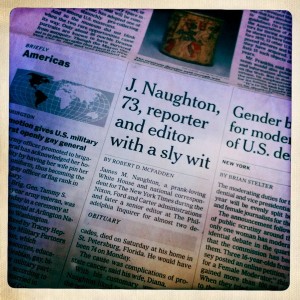On the Gorge de Verdon. Colour balance all wonky. Sigh.
Prematurity
I’m indebted to the many readers of the International Herald Tribune who spotted my obituary and emailed to convey their condolences. Just to put the record straight, I am not and have never been:
(a) 73
(b) a reporter
(c) an editor, or
(d) dead.
I do, however, claim a certain amount of sly wit.
In fact, the hack memorialised in the Trib is James M. Naughton who was
“a prank-loving White House and national correspondent for the New York Times during the Nixon, Ford and Carter administrations and later a senior editor at The Philadelphia Inquirer for almost two decades.”
My namesake also maintained that an occasional prank was essential to the spirit of journalism,
“and he enthusiastically abided by that belief, earning a reputation for twitting colleagues and candidates alike. He once turned up at a presidential press conference wearing the head of a chicken costume; another time, in Philadelphia, he had two motorcycles roar round his newsroom to liven things up. Good for morale, he said.”
A man after my own heart.
Premature obits have a long and honourable history in journalism. The classic case is Mark Twain’s celebrated riposte to his: “reports of my death have been greatly exaggerated”. One of my earliest mentors was the wonderful Claud Cockburn, who was very kind to me when I was an undergraduate in Ireland. In his respectable years he had worked for The Times and at one stage was sent to China to cover some obscure conflict in which he was reportedly killed, The paper duly published a brief obit, which he then read with glee and cabled the Editor saying “HAVE READ OBITUARY STOP KINDLY ADJUST SALARY ACCORDINGLY”.
In the summer of 1968 my girlfriend (later my first wife) and I stayed with him and his wife Patricia in Brook Lodge, their ramshackle but splendid house outside Youghal in Co. Cork. As we were leaving, Claud asked me what I proposed to do with my life. I replied that I was thinking of becoming a journalist. “Well then”, he said, solemnly, “you must remember that there is one golden rule for success in journalism: libel someone famous early in your career “.
Nuclear family?
Quote of the day
“Google has great customer service. Problem is, you’re not the customer.”
Letting sleeping dogs lie
Arles, July 2012.
Put not your trust in the Cloud — any cloud
This morning’s Observer column.
Most of the iCloud users of my acquaintance seem very happy with it. No more worrying about back-ups, or having out-of-date calendars on different devices. In return for an annual subscription, the great Church of Apple takes away the existential angst about data security that plagues less fortunate folks. And for as long as they stay within the enfolding arms of the Church, that blissful state will continue. That this is rather too good to be true should have been obvious to even the meanest intelligence, but it took a personal disaster last week finally to explode the illusion that single-church, cloud-based systems are the answers to everyone’s prayers.
The victim was a well-known technology journalist and iCloud subscriber named Mat Honan…
Lots of good stuff about this topic on the Web — for example this piece by Bob Cringely.
The sailing video the IOC doesn’t want us to see
Hilarious video that IOC lawyers tried to take down. Thanks to Wired for keeping it available.
Art and Illusion
I found this striking mural on a wall at La Palud-sur-Verdon on our way round the Gorge de Verdon. The juxtaposition with an oblivious reader was too good to miss.
Politics and the French language
Seen on a street in Arles, July 2012. From Orwell’s great essay on political language.
Remembering Robert Hughes
Somerset Maugham said that before embarking on a new book he read Voltaire’s Candide as a way of cleansing his style. Other writers have used Hemingway or Tom Wolfe in the same way. I have often reached for Robert Hughes or Clive James when feeling jaded or pedestrian, not because I wanted to try and emulate their styles but because I wanted to inhale something of their approach to writing: serious without being pompous; a talent for muscular prose with an inbuilt-capacity to shock or surprise; unwillingness to take the great and the good at their inflated estimations of themselves; and a wonderful capacity for caricature. Who will ever forget Clive’s description of Arnold Schwarzenegger as “a condom filled with walnuts”? Or Hughes’s dismissal of Jeff Koons? (“He has the slimy assurance, the gross patter about transcendence through art, of a blow-dried Baptist selling swamp acres in Florida. And the result is that you can’t imagine America’s singularly depraved culture without him.”)
So I mourn the passing of Robert Hughes, who even when he was wrong, was wrong in entertaining and thought-provoking ways. Looking for a round-up of obituaries and tributes, I went straight to the wonderful Arts & Letters Daily, which is normally terrific at doing that kind of round-up (See, for example, what they did for Gore Vidal recently). But, strangely, they seem to have missed out on Hughes.
So here is my tentative substitute.
My favourite, though, is Nick Cohen’s terrific tribute in the Spectator






